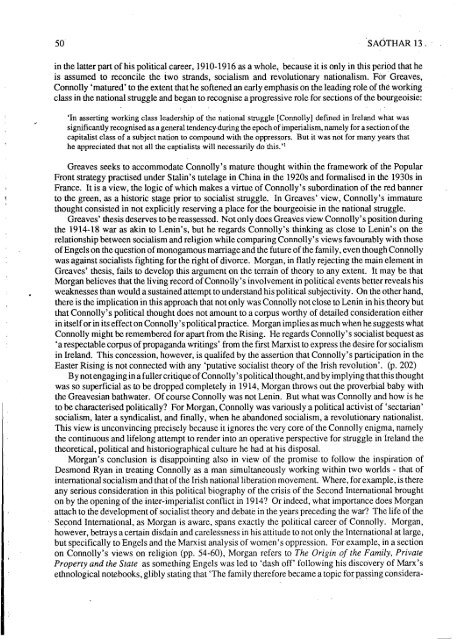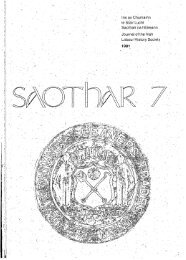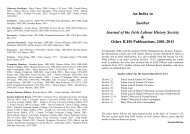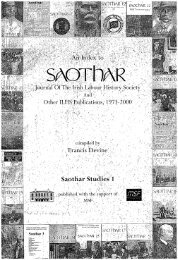50 SAOTHAR 13.in the latter part of his political career, 1910-1916 as a whole, because it is only in this period that heis assumed to reconcile the two strands, socialism and revolutionary nationalism. For Greaves,Connolly 'matured' to the extent that he softened an early emphasis on the leading role of the workingclass in the national struggle and began to recognise a progressive role for sections of the bourgeoisie:'In asserting working class leadership of the national struggle [Connolly] defined in Ireland what wassignificantly recognised as a general tendency during the epoch of imperialism. namely for a section of thecapitalist class of a subject nation to compound with the oppressors. But it was not for many years thathe appreciated that not all the captialists will necessarily do this.·1Greaves seeks to accommodate Connolly's mature thought within the framework of the PopularFront strategy practised under Stalin's tutelage in China in the 1920s and formalised in the 1930s inFrance. It is a view, the logic of which makes a virtue of Connolly's subordination of the red bannerto the green, as a historic stage prior to socialist struggle. In Greaves' view, Connolly's immaturethought consisted in not explicitly reserving a place for the bourgeoisie in the national struggle.Greaves' thesis deserves to be reassessed. Not onl y does Greaves view Connolly' s position duringthe 1914-18 war as akin to Lenin's, but he regards Connolly's thinking as close to Lenin's on therelationship between socialism and religion while comparing Connolly's views favourably with thoseof Engels on the question of monogamous marriage and the future of the family, even though Connollywas against socialists fighting for the right of divorce. Morgan, in flatly rejecting the main element inGreaves' thesis, fails to develop this argument on the terrain of theory to any extent. It may be thatMorgan believes that the living record of Connolly 's involvement in political events better reveals hisweaknesses than would a sustained attempt to understand his political subjectivity. On the other hand,there is the implication in this approach that not only was Connolly not close to Lenin in his theory butthat Connolly's political thought does not amount to a corpus worthy of detailed consideration eitherin itself or in its effect on Connolly' s political practice. Morgan implies as much when he suggests whatConnolly might be remembered for apart from the Rising. He regards Connolly's socialist bequest as'a respectable corpus of propaganda writings' from the first Marxist to express the desire for socialismin Ireland. This concession, however, is qualifed by the assertion that Connolly's participation in theEaster Rising is not connected with any 'putative socialist theory of the Irish revolution'. (p. 202)By not engaging in a fuller critique of Connolly' s political thought, and by implying that this thoughtwas so superficial as to be dropped completely in 1914, Morgan throws out the proverbial baby withthe Greavesian bathwater. Of course Connolly was not Lenin. But what was Connolly and how is heto be characterised politically? For Morgan, Connolly was variously a political activist of 'sectarian'socialism, later a syndicalist, and finally, when he abandoned socialism, a revolutionary nationalist.This view is unconvincing precisely because it ignores the very core of the Connolly enigma, namelythe continuous and lifelong attempt to render into an operative perspective for struggle in Ireland thetheoretical, political and historiographical culture he had at his disposal.Morgan's conclusion is disappointing also in view of the promise to follow the inspiration ofDesmond Ryan in treating Connolly as a man simultaneously working within two worlds - that ofinternational socialism and that of the Irish national liberation movement. Where, for example, is thereany serious consideration in this political biography of the crisis of the Second International broughton by the opening of the inter-imperialist conflict in 1914? Or indeed, what importance does Morganattach to the development of socialist theory and debate in the years preceding the war? The life of theSecond International, as Morgan is aware, spans exactly the political career of Connolly. Morgan,ho~ever, betrays a certain disdain and carelessness in his attitude to not only the International at large,but specifically to Engels and the Marxist analysis of women's oppression. For example, in a sectionon Connolly's views on religion (pp. 54-60), Morgan refers to The Origin of the Family, PrivateProperty and the State as something Engels was led to 'dash off' following his discovery of Marx'sethnological notebooks, glibly stating that 'The family therefore became a topic for rassing cbnsidera-
ESSAYS IN ~EVIEW 51tion' in the International. Bebel's classic work which reached its thirty third edition before beingtranslated into English and read by Connolly is summarily dismissed by Morgan as simply saying that'socialism was the answer to the women's question (whatever the question)'. (p. 55).More crucially, there is no attempt by Morgan to analyse the debates in the International on thenational question - a serious deficiency in a biography whose subject is a Marxist whose lifelongpreoccupation was with this matter and its relationship to socialism. Nor is there any discussion of thedebates on imperialism in the International and the divisions which were brought to a head in 1914 overhow the international socialist movement should respond to the new realities. Only in the context ofthe outbreak of the Boer War in 1899 does Morgan give some rather gnomic reference to the'contradictory' attitude of British-based SciCiaI Democraisand COnnolly's being less influenced by thisthan by what he saw on the streets of Dublin. (p. 36 ff.)Morgan has left us with a book that is laden with empirical detail, some of it new but not all of itcontributing to the thesis he wishes to sustain. The treatment ofConnolly' sLabour in Irish History andThe Reconquest of I re/and provides some usefully suggestive passages on Connoll y' s thinking on Irishhistory. (pp. 85-88, 105-107). The description of Connolly' s family background restates fairly vividlywhat we already know from other biographies, adding a detail here and there. The account of theRebellion could probably be developed to stand on its own as it is quite rich in logistical detail. TheLockout episode too is dealt with competently, though in both the account of the Lockout and of theRising, we only glimpse Connolly from time to time, as Morgan pursues different, often poorlyintegrated themes. The style of the book, and perhaps the choice of a biographical form itself, tendsto clutter the arguments or crowd them into the margins where they are stated rather baldly withoutproper development. In view of this it seems necessary to offer some suggestions to counter the overallimpression created by Morgan, namely of a Connolly who was without any worked-out conception tosustain him before and after the month of August, 1914.Connolly began to develop his own analysis of the Irish revolution in the mid-1890s after a numberof years on the Scottish Marxist left. His awareness of how Britain retarded Irish economicdevelopment led him to develop a schematic view of the relationship of the Irish national question toBritish colonialism and imperialism. In this schema, Connolly argued that independence on a capitalistbasis was not a viable road for Ireland to travel, the reason being, he argued (erroneously as it happens),that unless Ireland could gain overseas colonial markets it could not develop its fledgling industries.This theory identified the source of British imperial power as its monopoly of the trade of its coloniesthroughout its vast empire and its control of the seas. Connolly thus argued that an independent HomeRule Ireland could not develop economically due to the absence of overseas markets. This idea of'underconsumption' as the key to capitalist crisis was commonly expounded in Scottish and Englishsocial democratic circles in the mistaken belief that it was the view held by Marx. 2 In fact it arrivedfrom Germany but was transmitted by the followers of Lassalle. Connolly took it on board andaugmented it to deal with the problems of development in an independent Home Rule Ireland. Thistheory provided an objectivist explanation for a necessary confluence of the forces of socialism andnationalism in Ireland sooner or later.In his first period in Ireland (1896-1903), and after the initial introduction to his writings by JohnLeslie, Connolly incorporated the influence of the revol utionary populist, J ames Fintan Lalor, into hisreasoning on the impossibility of a viable Irish capitalism. Lalor had argued that the legislative question. of repeal of the Union was nothing more than the outer political echo of the social question embeddedin the ownership of landed property. Liberation of the peasants, qua labouring people, or the 'mostoppressed class', was the real kernel, he argued, of the national question. Connolly imbibed thisconception to develop an innovative theory of the Irish national struggle across the centuries in whichfeudalism and captialism were essentially a foreign implantation, and this theory implied that, in theconditions of the turn of the century, the wOl'-king class would inherit the centuries-long struggle againstthe class-based system of English colonialism. .But this perspective of ConnoUy's, summed up in his adage that 'the cause of labour is the cause
- Page 1 and 2: JOURNAL OF THE IRISH LABOUR HISTORY
- Page 3 and 4: ContentsPageEditorial: Labour Histo
- Page 5 and 6: EDITORIAL 3freedom to participate i
- Page 7 and 8: CorrespondenceThe Irish Labour Part
- Page 9 and 10: ; ~ ; ,The Decline and Fall of Donn
- Page 11 and 12: THE DECLINE AND FALL OF DONNYBROOK
- Page 13 and 14: THE DECLINE AND FALL OF DONNYBROOK
- Page 15 and 16: ·' THE DECLINE AND FALL OF DONNYBR
- Page 17 and 18: THE DECLINE AND FALL OF DONNYBROOK
- Page 19 and 20: THE DECLINE AND FALL OF DONNYBROOK
- Page 21 and 22: THE DECLINE AND FALL OF DONNYBROOK
- Page 23 and 24: THE DECLINE AND FALL OF DONNYBROOK
- Page 25 and 26: ,'-,;-''''.A PASSAGE TO BRITAIN 23C
- Page 27 and 28: A PASSAGE TO BRITAIN 25only in the
- Page 29 and 30: A PASSAGE TO BRITAIN 27clothing._De
- Page 31 and 32: A PASSAGE TO BRITAIN 29established
- Page 33 and 34: ;:-.",.- .. .", ...... '.:. '
- Page 35 and 36: LOUIE BENNETI 33feminist movement w
- Page 37 and 38: :... ~: ."
- Page 39 and 40: -.- '.LOUlE BENNETT 37While there i
- Page 41 and 42: LOUIE ~ENNEIT 39Xl's encyclical Qua
- Page 43 and 44: LOUIE BENNEIT 41Bennett's own relat
- Page 45 and 46: LODIE BENNETT 43109; IWWU resolutio
- Page 47 and 48: Essays in ReviewCosherers, Wanderer
- Page 49 and 50: ••• .".'. >. '~"ESSA YS IN RE
- Page 51: ESSAYS IN REVIEW 49ConnolIy:Myth an
- Page 55 and 56: ESSAYS IN REVIEW53International:'I
- Page 57 and 58: REVIEWScontroversy is real history.
- Page 59 and 60: REVIEWSJoe Monks was among the earl
- Page 61 and 62: REVIEWSnolly-Column Song','Proudly
- Page 63 and 64: REVIEWSresulting from the arrival o
- Page 65 and 66: REVIEWS,63the book by means of an a
- Page 67 and 68: REVIEWSlogue, it is hardly surprisi
- Page 69 and 70: The Team For All Workers ...CULIAIB
- Page 71 and 72: ESSAYS 69mission and moral refonn.l
- Page 73 and 74: .. ...... ~.~ -~ .'- '.ESSAYS. 71fr
- Page 75 and 76: ESSAYS 73claimed authority but whic
- Page 77 and 78: ESSAYS 75provided the basis for soc
- Page 79 and 80: ESSAYS 779. For comparisons see E.T
- Page 81 and 82: ESSAYS 7952. Annals of Christ Churc
- Page 83 and 84: ESSAYS' 81Fianna Fail and the Worki
- Page 85 and 86: ESSAYS 83Eireann in 1925 visibly di
- Page 87 and 88: ESSAYS 85recognition of the impract
- Page 89 and 90: ESSAYS 871970, it created the condi
- Page 91 and 92: ESSAYS89The Irish Immigrants' Contr
- Page 93 and 94: ESSAYS" 91Although anti -Catholic p
- Page 95 and 96: ESSAYS 93McCowie played a key role
- Page 97 and 98: :. -,,'.' ',. .~.,:.ESSAYS 95Althou
- Page 99 and 100: ESSAYS 97young girl of their own ba
- Page 101 and 102: SourcesIrish Labour History Society
- Page 103 and 104:
SOURCES 101INovember, 1971 to no. 1
- Page 105 and 106:
SOURCES 103would claim credit for t
- Page 107 and 108:
SOURCES105Sources for Irish Labour
- Page 109 and 110:
SOURCES 107NorthWest Archives and L
- Page 111 and 112:
SOURCES 109In 1966 the Finnish gove
- Page 113 and 114:
TURNINGANEWLEAFThe CPSSUis the larg
- Page 115 and 116:
REMINISCENCE 113us due to my politi
- Page 117 and 118:
REMINISCENCE 115when Jim was presen
- Page 119 and 120:
REMINISCENCE 117of Dail Eireann. 17
- Page 121 and 122:
REMINISCENCE 119NotesThe above arti
- Page 123 and 124:
DOCUMENT STUDY 121James Connolly in
- Page 125 and 126:
DOCUMENT STUDY123SOCIAL DEMOCRATIC
- Page 127 and 128:
DOCUMENT STUDY 125proletariat of th
- Page 129 and 130:
DOCUMENT STUDY 127the support of Je
- Page 131 and 132:
DOCUMENT STUDY 12926. The Workers'
- Page 133 and 134:
131BibliographyA Bibliography of Ir
- Page 135 and 136:
BIBLIOGRAPHY 133Compton, P.A. Demog
- Page 137 and 138:
BIBLIOGRAPHY 135Levine, I. and Madd
- Page 139 and 140:
BIBLIOGRAPHY 137Turner, M. 'Towards
- Page 141 and 142:
BIBLIOGRAPHY 1394. Land and Agricul
- Page 143 and 144:
BIBLIOGRAPHY 141Clogher Record12 (2
- Page 145 and 146:
BIBLIOGRAPHY 143Political Research
- Page 147 and 148:
BIBLIOGRAPHY 145Pres, 1987.O'Brien,
- Page 149 and 150:
147Notes on Contributorsf onathanBe
- Page 151 and 152:
1901: Ireland's first general union
- Page 153 and 154:
ELECTRICAL TRADES UNION .Establishe





